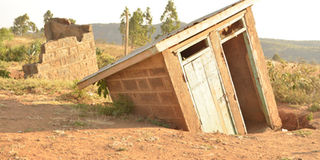Primary school in Kiambu in dire need of basic facilities

A sunken latrine structure at Gatune Primary School in Kikuyu, Kiambu County. The school is in a semi-arid part of Kiambu and is in dire need of basic facilities. PHOTO | ANNE MACHARIA | NATION MEDIA GROUP
What you need to know:
- Gatune Primary School is situated at the border of Kajiado and Kikuyu Sub County in Kiambu.
- In the school compound, one of the latrines has collapsed and is unusable.
- It does not have a school feeding programme despite the area being semi-arid.
- Baboons also invade neighbouring farms and destroy crops such as maize.
A primary school situated in a semi arid part of Kikuyu in Kiambu County is in a sorry state as it lacks basic facilities.
Gatune Primary School is two hours’ drive from Kikuyu Town, along a stretch of rocky, bumpy and dusty road that seems to lead to nowhere.
It is situated at the border of Kajiado and Kikuyu Sub-County in Kiambu
However, one eventually arrives at the school, after going through a steep section of the road where passengers have to alight to allow vehicles to ascend.
The plight of the school came to light Monday when a community-based organisation (CBO) visited with donations.
The Girls Can CBO gave out sanitary towels, innerwear and soaps to Class Five to Class Eight pupils who lacked them.
The founder of the Girls Can CBO, Catherine Gitungo, said that Kiambu was said to be among the wealthiest counties, yet there were hundreds of families so much in dire need of basic necessities that they could not buy sanitary towels and innerwear for their girls.

Girls at Gatune Primary School with donations they received from Girls Can, a local CBO.
“The CBO will continue visiting Gatune Primary School, since these children are the ones who will develop this area and are the future and the hope of our country. We must take care of them,” said Ms Gitungo.
Some of the girls who benefitted were Martha Wanjiru, Lilian Wamuyu and Sarah Pamela, who were invited from home to the school to receive the donations, and they said they were happy with the gifts that would help them in their hygiene.
A parent, George Ndungu, said most parents in the school and area were poor and could not afford to buy such "luxuries" as sanitary towels, and pupils resorted to using leaves and rags.
The headmaster, Benson Thandi, said the school was in a hardship area with no adequate transport means.
Luckily, he owns a motorbike, which he uses to go to the school every day in about 20 minutes.
Mr Thandi added that the school has 214 pupils and nine teachers, who, he said, were adequate for a school with eight classrooms.
In the school compound, the structure of one of the latrines has collapsed on itself, making the latrine unusable.

Boys at Gatune Primary School received toilet soap from the Girls Can CBO.
NO FEEDING PROGRAMME
The school does not have a school feeding programme although the area is semi-arid and even goes for three years without rains.
The area's residents also complain about the presence of nearly 400 baboons, whic terrorise women and also feed on their crops before they even mature for harvesting.
There are also a lot of cattle raids said to be carried out by rustlers from neighbouring Kajiado County and revenge attacks by people from Kiambu County.
The community hopes the Kenya Pipeline Company, through its community social responsibility (CSR) programme, will come to their aid since one of their main oil pipelines passes through their area.
A resident, Mary Wangari said, “We see at least five small airplanes everyday patrolling the area, monitoring the KPC pipeline but they have not given anything back to the community.”
BABOONS TERROR
“The baboons terrorise the women. Their leader, a big baboon, stands guard and signals to the others, about 400 of them, to enter the farms. They destroy the maize crops before they mature and chew on the stems like one would do on sugarcane," Ms Wangari said.
“I think we are forgotten because we are so far away from the towns and at the border of two administrative units. Even our children suffer a lot learning from here,” said Susan Nyamwathi, another resident.
Winnie Ndungu, who works at the Kikuyu education office, said that the ministry must partner with NGOs, CBOs and other private individuals to improve the education standards in the country.
“We cannot do it alone, but helping children like these ones at the extreme end of Kikuyu must be through partnerships with non-government bodies, and reduce the rate of absenteeism in schools that results in poor performance as girls miss lessons during their monthly periods,” said Ms Ndungu.




